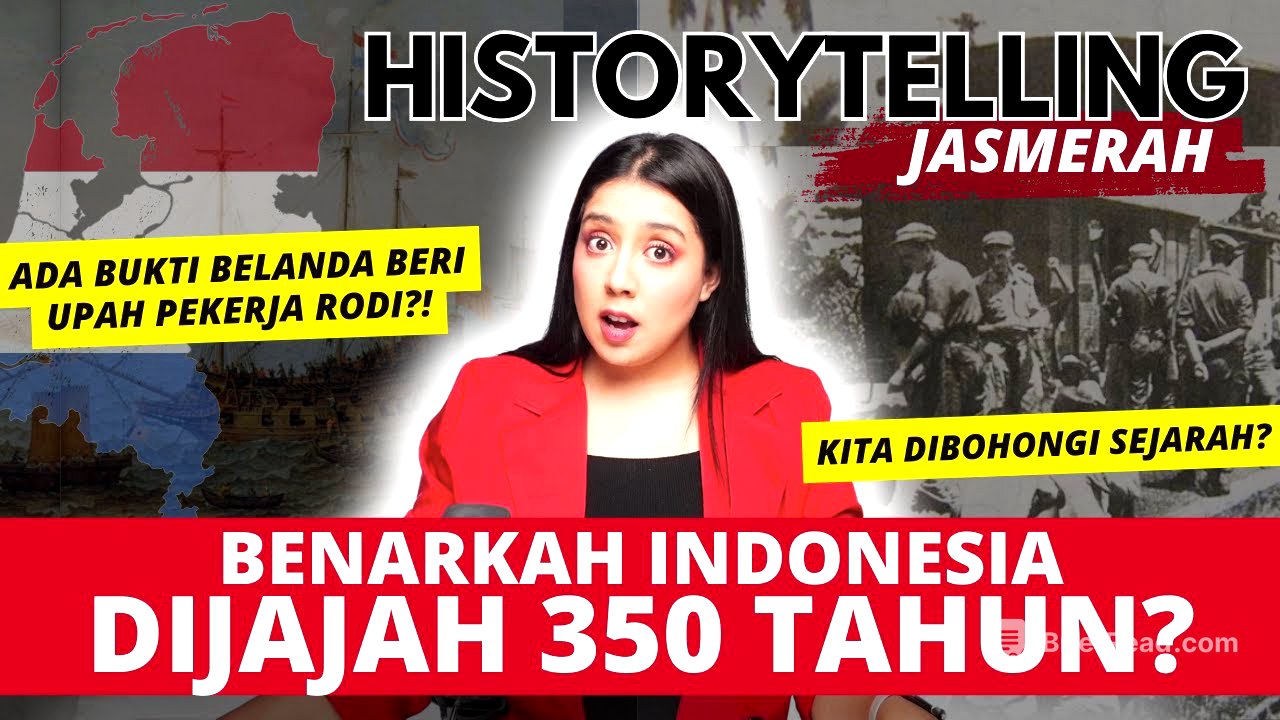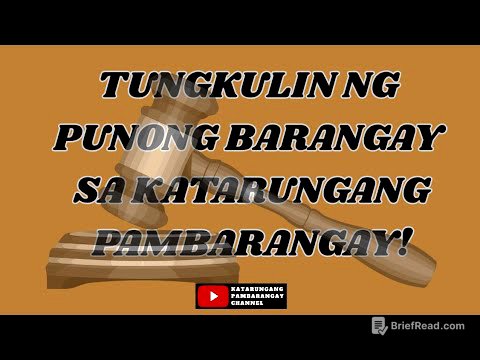TLDR;
This video discusses the history of Indonesian colonialism, starting with the arrival of the Portuguese in 1512 and ending with the proclamation of Indonesian independence in 1945. It covers the spice trade, the roles of the Portuguese, Spanish, English, and Dutch, the rise and fall of the VOC, the periods of French and British rule, the forced cultivation system, ethical politics, and the Japanese occupation. The video also addresses the debate over the length of the colonial period and encourages viewers to reflect on the lessons of history.
- Portuguese were the first to arrive in Indonesia in 1512 seeking spices.
- The Dutch East India Company (VOC) was formed in 1602 and eventually gained significant power, leading to exploitation and suffering for the Indonesian people.
- The forced cultivation system implemented by the Dutch caused widespread poverty and hunger.
- Ethical politics in 1901 aimed to improve the living standards of the Indonesian people through irrigation, education, and immigration, but had limited success.
- The Japanese occupation from 1942 to 1945 was marked by forced labor and inhumane treatment of the Indonesian people.
Introduction [0:08]
The video starts by addressing the claim made by Indonesia's first president, Soekarno, that the nation was colonized for 350 years. The host expresses her intention to discuss the history of Indonesian colonialism, inviting viewers to share additional information or corrections in the comments. She shares a personal anecdote about seeing spice storage under buildings in Amsterdam, highlighting the historical significance of Indonesian spices to the Netherlands.
Early European Presence and Spice Trade [1:16]
The Portuguese were the first Western nation to arrive in the archipelago in 1512, landing in Maluku to capitalize on the lucrative spice trade. Spices were highly valued, worth as much as gold, due to Indonesia's fertile land. The spice trade was centered in Malacca, attracting various European powers. In 1521, Spain also arrived in Indonesia, leading to conflicts with the Portuguese. The Treaty of Zaragoza in 1529 divided the region, with Spain leaving Maluku for the Philippines, explaining the enduring Spanish influence there. The Portuguese maintained their presence in Maluku.
The Dutch Arrive and Establish the VOC [2:49]
In 1579, the English arrived in the archipelago seeking spices, followed by increasing numbers of English sailors who traded and gathered information. By 1596, Dutch ships, commanded by Cornelis de Houtman, reached Banten with the same goal: to acquire spices. The Portuguese and Spanish had kept the archipelago's existence secret, but Dutch crew members on Portuguese ships documented sailing strategies and resources, bringing this knowledge back to the Netherlands. This led to increased competition among European businessmen to control the spice trade. To manage this competition, the Dutch formed the VOC (East Indies Company) in 1602, a trade union designed to standardize spice prices and prevent internal competition.
VOC's Rise to Power and Colonial Practices [5:01]
Initially, the VOC was a merchant association, but the Dutch government granted it extensive powers, including the right to monopolize trade, issue currency, build forts, form an army, wage war, and govern colonies. These privileges allowed the VOC to dominate the archipelago, viewing other countries as enemies and controlling key areas like Batavia and Java. The VOC's actions marked the beginning of Dutch colonialism in the archipelago. In 1602, the British also arrived in Banten, seeking trade relations, and established trading offices in various locations.
Conflicts and VOC Expansion [6:48]
The VOC, allied with local residents in Ambon, formed an anti-Portuguese group, gaining exclusive rights to buy spices in Hitu. In 1605, VOC ships attacked the Portuguese in Ambon, leading to the Portuguese surrender. The VOC forced armed Portuguese troops to leave Maluku, while those who stayed had to pledge allegiance to the Dutch. By the end of the 16th century, the Portuguese lost their power in Maluku, displaced by the Dutch and local sultanates. The Portuguese were only able to defend their territory in East Timor until they were forced to leave the archipelago after 93 years.
VOC's Ruthless Rule and Bankruptcy [8:46]
The VOC claimed political and economic power on Java, but their rule was marked by ruthlessness and exploitation. They sought maximum profit through monopolized trade practices. During Peter Shan Kun's governance, the VOC was particularly arbitrary, such as violently suppressing nutmeg sales to British traders in the Banda Islands and enslaving locals. Due to poor management, greed, and violent control tactics, the VOC eventually went bankrupt. In response, the Dutch kingdom took over the VOC's assets to cover the country's debts, bringing Nusantara under the control of the Dutch Republic.
The Era of Herman Willem Daendels [10:18]
From 1808 to 1811, Herman Willem Daendels governed Nusantara with the primary task of defending Java from the British. Initially, Daendels was viewed positively as a young, democratic leader, bringing hope to the people. He initiated development projects, but his methods became increasingly cruel, particularly through the forced labor system used to construct the 1100 km Anyar Panarukan highway. This project, intended to improve government transportation, resulted in the deaths of approximately 12,000 people due to harsh conditions and lack of pay.
Corruption and British Interlude [12:19]
Despite records showing that Daendels allocated funds for worker salaries, the workers never received their wages, raising questions about corruption. In 1811, British troops seized Batavia from the Netherlands, and Daendels was replaced by Thomas Stamford Raffles. Raffles abolished forced labor, trade monopolies, and slavery, but implemented a land rental system, claiming all land belonged to the government and requiring farmers to pay rent.
Return of the Dutch and the Forced Cultivation System [14:25]
In 1814, the London Convention returned the archipelago to the Netherlands, which was financially strained. Johannes van den Bosch introduced the forced cultivation system (cultuurstelsel) to exploit natural resources and force farmers to grow profitable crops like coffee, sugar cane, tobacco, tea, and indigo. This policy generated significant profits for the Dutch government but caused immense suffering, poverty, and hunger for the Indonesian people.
Exploitation and Criticism of Forced Cultivation [16:08]
The forced cultivation system required people to surrender their lands and excess harvests without compensation, while crop failures were the farmers' responsibility. The system, initially voluntary, became coercive. Criticism arose from figures like Dowes Dekker, who, under the pseudonym Multatuli, wrote "Max Havelaar," condemning the Dutch government for the suffering caused by the system. This criticism led to the gradual abolition of the forced cultivation system, replaced by a liberal economic system in 1870.
Liberal Era and Economic Shifts [17:30]
The liberal era saw economic improvements in Java, with indigenous people renting their lands to Dutch parties for large plantations, creating opportunities for plantation work. However, the gap between Dutch profits and the welfare of the Indonesian people remained vast, leading to declining living standards. A trade crisis in 1885, caused by Europe growing its own sugar, further impacted the Indonesian economy.
Ethical Politics and Its Impact [18:35]
In 1901, Queen Wilhelmina announced the ethical politics policy, acknowledging Dutch responsibility towards the indigenous people. The policy focused on irrigation, education, and immigration, but failed to significantly improve living standards. However, education, a key component of the policy, provided Indonesian elites with exposure to Western political ideas like independence and democracy, which ultimately fueled dissatisfaction with colonial rule and fostered a sense of national identity.
Japanese Occupation and the Path to Independence [20:07]
By 1904, Aceh was forced to recognize Dutch sovereignty. On December 8, 1941, Pearl Harbor was attacked, and on January 11, Japanese troops entered Indonesia, seeking resources for their war efforts. Initially, the Indonesian people were hopeful about the Japanese arrival, viewing them as liberators. However, the Japanese occupation soon turned oppressive, with forced labor (romusha) and inhumane treatment surpassing even the Dutch era. This period lasted until August 17, 1945, when Indonesian independence was proclaimed.
Debate on the Length of Colonization and Conclusion [23:24]
The video addresses the debate over whether Indonesia was colonized for 350 years, as stated by President Soekarno. Some historians argue the period was shorter, calculated from when the VOC was taken over by the Dutch government or when Aceh recognized Dutch sovereignty. The host encourages viewers to share their definitions of colonization. Regardless of the exact duration, the video emphasizes the importance of learning from history to avoid repeating past tragedies and to guide the country's progress.









